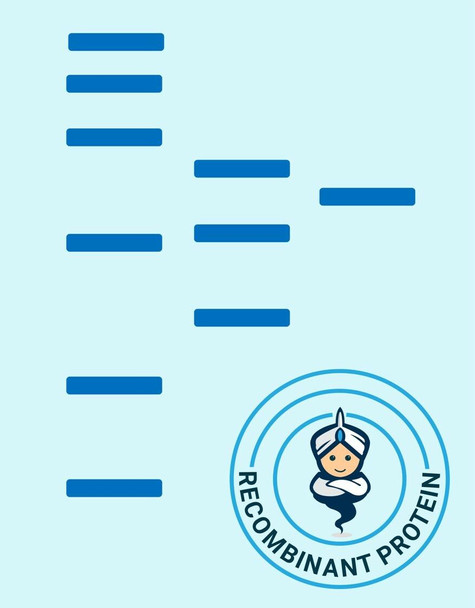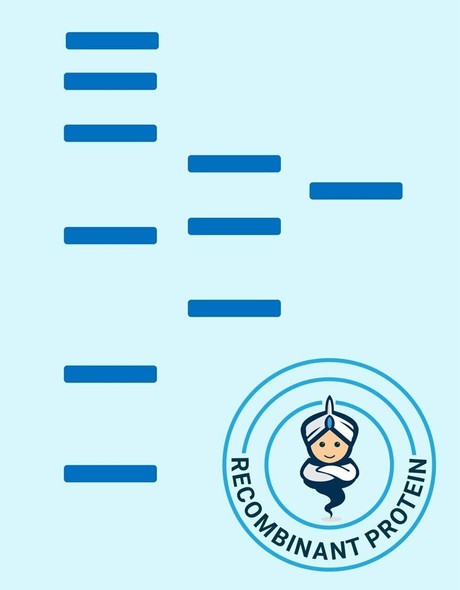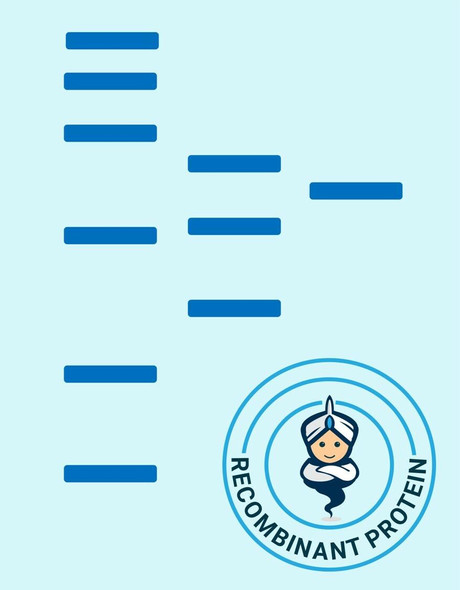Human S100A11 Recombinant Protein (RPPB4548)
- SKU:
- RPPB4548
- Product type:
- Recombinant Protein
- Size:
- 10ug
- Species:
- Human
- Target:
- S100A11
- Synonyms:
- Protein S100-A11
- S100 calcium-binding protein A11
- Calgizzarin
- MLN 70
- Source:
- Escherichia Coli
- Uniprot:
- P31949
Description
| Product Name: | Human S100A11 Recombinant Protein |
| Product Code: | RPPB4548 |
| Size: | 10µg |
| Species: | Human |
| Target: | S100A11 |
| Synonyms: | Protein S100-A11, S100 calcium-binding protein A11, Calgizzarin, MLN 70, S100A11, MLN70, S100C. |
| Source: | Escherichia Coli |
| Formulation: | S100A11 is supplied in PBS and 50% glycerol. |
| Stability: | Store at 4°C if entire vial will be used within 1-2 weeks. Store, frozen at -20°C for longer periods of time. Avoid multiple freeze-thaw cycles. |
| Purity: | Greater than 95% as determined by SDS-PAGE. 2 bands on Western blot at 17 and 34 kDa, respectively representing monomeric and dimeric form. |
S100A11 is a member of the S100 family of proteins which contains two EF-hand calcium-binding motifs and is thought to be involved in the regulation of a number of cellular processes including cell cycle progression and differentiation. S100A11 may function in motility, invasion and tubulin polymerisation. S100 proteins are localized either in the cytoplasm or the nucleus of a wide range of cells. There are at least 13 members in the S100 gene family, which are located as a cluster on chromosome 1q21. Chromosomal rearrangements and altered expression of S100A11 have been implicated in tumor metastasis.
S100A11 Human Recombinant is expressed in E. coli having a molecular weight of 17kDa fused to an amino terminal hexahistidine tag.
| UniProt Protein Function: | S100A11: a calcium-binding regulatory protein of the S-100 family. Interacts with the N-termini of annexins A1. May regulate fusion processes such as endo- and exocytosis. Increases in the early stage of pancreatic carcinogenesis and decreases during subsequent progression to cancer. Increased expression in anaplastic large cell lymphoma. |
| UniProt Protein Details: | Protein type:Calcium-binding; DNA replication; Cell cycle regulation Chromosomal Location of Human Ortholog: 1q21 Cellular Component: cytoplasm; extracellular space; nucleus; ruffle Molecular Function:calcium-dependent protein binding; protein binding; protein homodimerization activity Biological Process: negative regulation of cell proliferation; negative regulation of DNA replication; signal transduction |
| NCBI Summary: | The protein encoded by this gene is a member of the S100 family of proteins containing 2 EF-hand calcium-binding motifs. S100 proteins are localized in the cytoplasm and/or nucleus of a wide range of cells, and involved in the regulation of a number of cellular processes such as cell cycle progression and differentiation. S100 genes include at least 13 members which are located as a cluster on chromosome 1q21. This protein may function in motility, invasion, and tubulin polymerization. Chromosomal rearrangements and altered expression of this gene have been implicated in tumor metastasis. [provided by RefSeq, Jul 2008] |
| UniProt Code: | P31949 |
| NCBI GenInfo Identifier: | 1710818 |
| NCBI Gene ID: | 6282 |
| NCBI Accession: | P31949.2 |
| UniProt Secondary Accession: | P31949,Q5VTK0, |
| UniProt Related Accession: | P31949 |
| Molecular Weight: | 11,740 Da |
| NCBI Full Name: | Protein S100-A11 |
| NCBI Synonym Full Names: | S100 calcium binding protein A11 |
| NCBI Official Symbol: | S100A11 |
| NCBI Official Synonym Symbols: | MLN70; S100C; HEL-S-43 |
| NCBI Protein Information: | protein S100-A11 |
| UniProt Protein Name: | Protein S100-A11 |
| UniProt Synonym Protein Names: | Calgizzarin; Metastatic lymph node gene 70 protein; MLN 70 |
| Protein Family: | Protein |
| UniProt Gene Name: | S100A11 |
| UniProt Entry Name: | S10AB_HUMAN |










